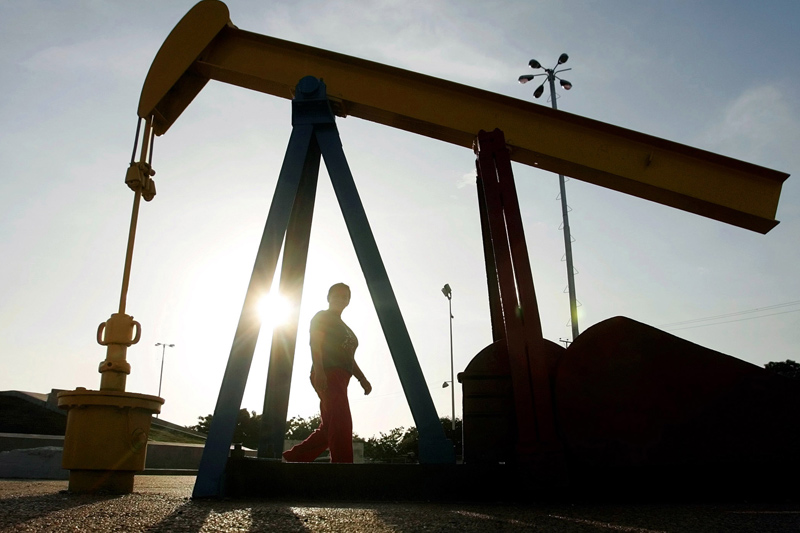Investing.com - Crude oil futures declined on Monday, as investors cashed out of the market to lock in gains from a rally that took prices to a nine-month high, while heightened tension over Iran's disputed nuclear program remained supportive.
On the New York Mercantile Exchange, light sweet crude futures for delivery in April traded at USD108.62 a barrel during European morning trade, tumbling 1.05%.
It earlier fell by as much as 1.15% to trade at a session low USD108.53 a barrel. On Friday, prices rose to USD109.92 a barrel, the highest since May 4.
Crude oil prices advanced in each of the past seven trading sessions leading up to Monday, the longest streak of gains since January 2010.
The April contract rallied nearly 9.5% in the past two weeks as the oil market was dominated by growing concerns over a disruption to Iranian oil exports.
The stand-off between Iran and Western countries has dominated sentiment in the oil market for weeks, raising fears that the escalating row over Tehran's nuclear program could lead to an oil-export halt, a disruption to shipping traffic in the Strait of Hormuz or military conflict.
Iran produces about 3.5 million barrels of oil a day, making it the second largest oil producer in the Organization of Petroleum Exporting Countries, after Saudi Arabia.
However, the sharp jump in prices prompted some investors to sell their position and lock in gains on profit taking amid concerns that the recent surge in energy prices will derail the fragile global economic recovery.
International Monetary Fund Managing Director Christine Lagarde said in a statement after a weekend meeting of finance ministers from the Group of 20 nations in Mexico that the world economy is “not out of the danger zone”, citing fragile financial systems, high public and private debt and rising oil prices.
Meanwhile, fears over the euro zone’s sovereign debt crisis lingered after a weekend meeting of the G20 finance ministers and central bankers failed to make progress on increasing the size of the IMF’s lending capacity.
The G-20 postponed a decision on a global bailout package to address the debt crisis in the euro zone and said any decision on outside help will be conditional upon on European governments increasing the size of their firewall in the next two months.
Markets were also jittery as Germany’s parliament was preparing to vote later Monday on a EUR130 billion bailout package for Greece, which was agreed upon by euro zone finance ministers last week.
The euro zone accounted for nearly 16% of global oil consumption in 2010, according to data from British Petroleum.
Elsewhere, on the ICE Futures Exchange, Brent oil futures for April delivery retreated 1.1% to trade at USD124.11 a barrel, with the spread between the Brent and crude contracts standing at USD15.49.
Brent futures have rallied nearly 15% since the start of 2012 as geopolitical and production issues in Iran, the North Sea, South Sudan, Syria and Yemen tightened supplies.
On the New York Mercantile Exchange, light sweet crude futures for delivery in April traded at USD108.62 a barrel during European morning trade, tumbling 1.05%.
It earlier fell by as much as 1.15% to trade at a session low USD108.53 a barrel. On Friday, prices rose to USD109.92 a barrel, the highest since May 4.
Crude oil prices advanced in each of the past seven trading sessions leading up to Monday, the longest streak of gains since January 2010.
The April contract rallied nearly 9.5% in the past two weeks as the oil market was dominated by growing concerns over a disruption to Iranian oil exports.
The stand-off between Iran and Western countries has dominated sentiment in the oil market for weeks, raising fears that the escalating row over Tehran's nuclear program could lead to an oil-export halt, a disruption to shipping traffic in the Strait of Hormuz or military conflict.
Iran produces about 3.5 million barrels of oil a day, making it the second largest oil producer in the Organization of Petroleum Exporting Countries, after Saudi Arabia.
However, the sharp jump in prices prompted some investors to sell their position and lock in gains on profit taking amid concerns that the recent surge in energy prices will derail the fragile global economic recovery.
International Monetary Fund Managing Director Christine Lagarde said in a statement after a weekend meeting of finance ministers from the Group of 20 nations in Mexico that the world economy is “not out of the danger zone”, citing fragile financial systems, high public and private debt and rising oil prices.
Meanwhile, fears over the euro zone’s sovereign debt crisis lingered after a weekend meeting of the G20 finance ministers and central bankers failed to make progress on increasing the size of the IMF’s lending capacity.
The G-20 postponed a decision on a global bailout package to address the debt crisis in the euro zone and said any decision on outside help will be conditional upon on European governments increasing the size of their firewall in the next two months.
Markets were also jittery as Germany’s parliament was preparing to vote later Monday on a EUR130 billion bailout package for Greece, which was agreed upon by euro zone finance ministers last week.
The euro zone accounted for nearly 16% of global oil consumption in 2010, according to data from British Petroleum.
Elsewhere, on the ICE Futures Exchange, Brent oil futures for April delivery retreated 1.1% to trade at USD124.11 a barrel, with the spread between the Brent and crude contracts standing at USD15.49.
Brent futures have rallied nearly 15% since the start of 2012 as geopolitical and production issues in Iran, the North Sea, South Sudan, Syria and Yemen tightened supplies.
